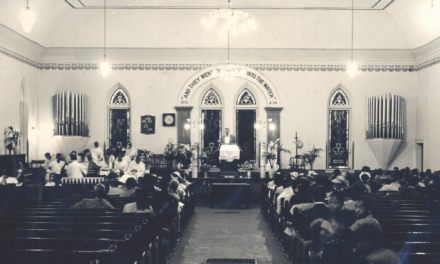
 The decision is key as states and districts nationwide face similar challenges in educating students on Black history. (Photo Credit: Credit: Jenni Girtman / Atlanta-Journal Constitutionc)
The decision is key as states and districts nationwide face similar challenges in educating students on Black history. (Photo Credit: Credit: Jenni Girtman / Atlanta-Journal Constitutionc)
In a significant turnaround, Georgia Superintendent Richard Woods said last week that the state would pay for districts to teach a new Advanced Placement course in African American Studies, a day after he announced the elimination of the course and that districts could only teach the course using local funds.
Following a public outcry, the Georgia Department of Education now says districts are free to teach the course, and the state will pay for it as long as they use a ‘lower-level introductory code linked to an existing state-approved course in African American studies. This means that while the course is still optional in classrooms, it will no longer be eligible for college credit or calculated into the student’s G.P.A.
“Districts can choose to use that course code and teach some or all of the standards in the AP course, and students may take the associated AP exam,” Meghan Frick, a spokesperson for the state department, wrote in response to Associated Press questions.
However, the reversal did little to reduce the pushback to Woods’ earlier refusal. In a rally at the Georgia Capitol, 15 mostly Democratic speakers attacked the elected Republican, saying he was trying to keep students from learning about Georgia’s history.
Georgia State Senator Nikki Merritt (D) from Lawrenceville says the decision to remove the course “strips away a vital opportunity for students to engage with and understand a vital part of their history.”
“We are gathered here today in solidarity, standing firm with our students and teachers who have been blindsided by an abrupt and unjust decision to remove AP African American Studies reports from our state curriculum.”
Gwinnett County Refuses Course
On Tuesday, Gwinnett County, Georgia’s largest school district, announced that they won’t teach the course under the new stipulations, citing that students would be “cheated out of credit for the difficulty of the work.”
“State-approved AP courses award students additional grade point average (GPA) benefits that impact HOPE and Zell Miller Scholarship eligibility. After our announcement, the state provided updated guidance regarding funding, course number assignment, and the flexibility to embed AP African American Studies topics in our Introduction to African American Studies course,” GCPS Superintendent Dr. Calvin Watts said in a statement.
Because students won’t receive college credit or GPA calculation that AP courses typically carry, Superintendent Watts says that the course won’t count as a rigorous course.
“The solutions offered provide a path for students to be exposed to the content and rigorous coursework; however, they fall short of addressing our concern that their GPAs would not be calculated the same way as students completing other AP courses in Georgia,” Dr. Watts said.
The Gwinnett NAACP released a statement reading:
“If Superintendent Woods seeks to rectify this situation, he must reinstate the state code for the African American AP course. Anything less is mere window dressing and fails to restore the course to its rightful status as an AP course, equivalent to all other AP courses in the state catalog.”
A National Controversy
Efforts to keep AP African American Studies out of schools became a national controversy in 2023 when Florida Republican Gov. Ron DeSantis said he would ban it because it “pushed a political agenda.” In June, South Carolina officials also refused to add the course to its list of approved courses but said individual districts could still choose to offer it if they preferred.
State officials in Arkansas said the course will count for credit in the coming school year. They denied such credit last year, but six of the state’s schools taught the pilot course anyway.
RELATED: The Challenge of Succeeding as a Black Student in America
So far, 18 states have passed such bans, and some individual school districts nationwide have also declined to offer the course. Other districts vowed to teach the classes even if the state didn’t pay for it.
What Exactly Does AP African American Studies Teach?
The College Board, a nonprofit testing organization, offers Advanced Placement courses in various academic subjects, such as math, science, social studies, foreign languages, and fine arts. These courses are voluntary and taught at a level similar to college classes. Students who perform well on the final exams are often eligible for college credit.
According to the College Board website, the AP African American interdisciplinary course draws from various fields — history, literature, the arts, geography, and science — to explore Black people’s vital contributions and experiences, from ancient African societies to the present.
To develop this course framework, the AP Program consulted with professors from more than 200 colleges nationwide, including dozens of historically Black colleges and universities and dedicated high school teachers nationwide.
For Black students, particularly those aiming for college, excelling in this course could boost their college applications and readiness for higher education. But, according to an analysis of the most recent federal data by the Education Trust, although Black students make up 15% of high schoolers nationwide, only 9% are enrolled in at least one AP course.
 Source: Ed Trust calculations based on the 2015–16 Civil Rights Data Collection (CRDC) and the 2015–16 Common Core of Data (CCD).
Source: Ed Trust calculations based on the 2015–16 Civil Rights Data Collection (CRDC) and the 2015–16 Common Core of Data (CCD).
Kaya Henderson, founder and CEO of Reconstruction, a curriculum company, and past chancellor of the District of Columbia Public Schools, says relevant and engaging material such as the AP course will yield amazing results.
“It is rigorous. It will challenge students’ thinking. It reflects the world that our students see today. Every student should have the opportunity to take this class.”
Where Do We Go From Here?
The recent decision highlights ongoing tensions in Georgia’s approach to education involving race and history. The state’s initial refusal and subsequent reversal will likely impact how Black students and their families view its commitment to offering a diverse and inclusive curriculum.
“Withholding state approval for this AP course sends the message that the contributions and experiences of African Americans are not worthy of academic study at the same level as other approved AP courses,” Gwinnett County Superintendent Calvin Watts said in a statement.
According to The Associated Press, Superintendent Woods also faced questions from Republican Gov. Brian Kemp, who sent a letter asking how Woods arrived at his original decision to block state funding. In the letter, Kemp reportedly described himself as “a longtime believer that families should ultimately make the decisions which best meet their child’s academic needs and futures.”
“As you know, the wellbeing of Georgia’s children and their education opportunities is one of my top priorities,” Kemp wrote.
Woods hasn’t explained his refusal in-depth but said in a Wednesday statement that he had “concerns about the state endorsing the totality of the course.”
Stan DeJarnett, chair of the State Board of Education, said in a statement that “No one is preventing any school system in Georgia from offering this course if they choose to do so,” echoing the department’s current position that districts can use state money even if the state isn’t listing the course in its catalog.
Supporters of the course rejected the state’s new position, saying Georgia’s original refusal to recognize it was discriminatory.
“To suggest that course is somehow less than is not OK,” said state Rep. Jasmine Clark, a Democrat from Lilburn.
“Gwinnett is working tirelessly to do right by their students,” state Rep. Jasmine Clark said, a Lilburn Democrat who helped spearhead pushback against Woods. “As a parent of GCPS student, all I want for my child is to have the same opportunities as students taking other AP courses, should she choose to want to learn more about the contributions of her ancestors in a rigorous, college-level course.”



